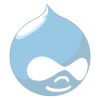Drupal platform

Drupal is a free and open-source content management framework (CMF) written in PHP and distributed under the GNU General Public License. It is used as a back-end system for at least 2.1% of all websites worldwide ranging from personal blogs to corporate, political, and government sites including whitehouse.gov and data.gov.uk. It is also used for knowledge management and business collaboration.
The standard release of Drupal, known as Drupal core, contains basic features common to content management systems. These include user account registration and maintenance, menu management, RSS feeds, page layout customization, and system administration. The Drupal core installation can be used as a brochureware website, a single- or multi-user blog, an Internet forum, or a community website providing for user-generated content.
As of January 2013, there are more than 20,100 free community-contributed addons, known as contributed modules, available to alter and extend Drupal's core capabilities and add new features or customize Drupal's behavior and appearance. Because of this plug-in extensibility and modular design, Drupal is described as a content management framework. Drupal is also described as a web application framework, as it meets the generally accepted feature requirements for such frameworks.
Although Drupal offers a sophisticated programming interface for developers, no programming skills are required for basic website installation and administration.
Drupal runs on any computing platform that supports both a web server capable of running PHP (including Apache, IIS, Lighttpd, Hiawatha, Cherokee or Nginx) and a database (such as MySQL, MongoDB, MariaDB, PostgreSQL, SQLite, or Microsoft SQL Server) to store content and settings. Drupal 6 requires PHP 4.4.0 or higher, while Drupal 7 requires PHP 5.2.5 or higher.

